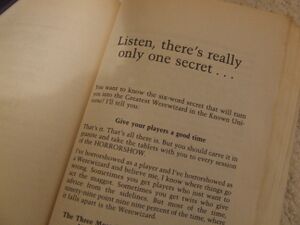Rule Zero
Rule Zero is supposed to be the most important rule of any RPG game. It's called the "zero-th rule" because it is so fundamental that it comes before even the first rule stated in any rulebook. It's also a meta-rule, so it doesn't really fit into any numbered lists of rules.
Sometimes this rule is confused with the Golden Rule: "whatever the DM says, goes."
Suffice to say, That Guy is not a fan of either of the above.
Definition
| Rule Zero:
"Roleplaying games are entertainment; your goal as a group is to make your games as entertaining as possible." |
If that means breaking the rules temporarily, or permanently as a house-rule, then so be it.
Good RPGs will mention it or something like it in the game-master's section, usually something wishy-washy like "these rules are only a guideline."

Citations
- In Basic D&D in 1980, the book says on the first page:
- "Anything in this booklet (and other D&D booklets) should be thought of as changeable -- anything, that is, that the DM thinks should be changed... The purpose of these 'rules' is to provide guidelines that enable you to play and have fun, so don't feel absolutely bound to them."
- In AD&D, the player's handbook has on page 8:
- "This game is unlike chess in that the rules are not cut and dried. In many places they are guidelines and suggested methods only."
- Through at least the fourth edition of Magic: The Gathering, the rulebook featured a section on house rules and offered a couple of suggestions of common ones (including not playing for ante and restricted card pools to level the field between players with large and small collections).
- Dungeons & Dragons 3e doesn't explicitly state the rules can go hang, but it does have a section for changing the rules to suit your group (DMG, pg 11).
- D&D 3.5 states in several places that the DM can treat any rule as a mere suggestion at any time. Examples: bottom of page 64, Player's Handbook (Access to Skills), and most directly in the DMG on page 6: "Good players will always recognize that you have ultimate authority over the game mechanics, even superseding something in a rulebook."
- D&D 4e also has a section on creating house rules (DMG, pg 189).
- Warhammer 40,000 4th edition rulebook have an awesome entry at page 5:
- "The most important rule about playing games of WH 40k is to have fun. Now while having fun can often be gained by mercilessly crushing your opponents forces, never ever forget that you are both here to have fun... If you can play nice and treat your opponent with respect and mercilessly crush their forces at the same time, you really are a winner. "
- In Vampire: The Masquerade, the core book says:
- "This is the most important rule of all, and the only real rule worth following: There are no rules. The world is far too big - it can't be reflected accurately in any set of inflexible rules. Think of this book as a collection of guidelines, suggested but not mandatory ways of capturing the World of Darkness in the format of a game. You're the arbiter of what works best in your game, and you're free to use, alter, abuse or ignore these rules at your leisure. "